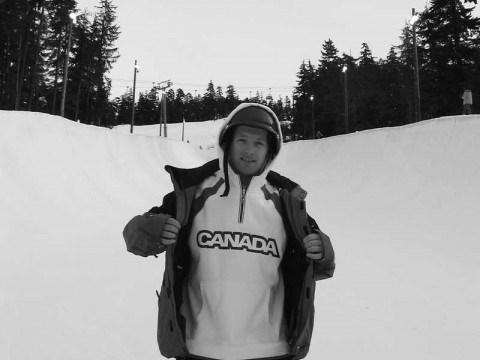Crispin Lipscomb is not, repeat, not retiring. When it comes to snowboarding and halfpipe, he loves the sport as much as he ever has, and after years of training for the 2010 Games his skills are probably the sharpest they've ever been.
But circumstances change and with them so have Lipscomb's priorities.
One of the catalysts for change was the sudden death of his close friend Anthony Crute. Crute, who owned and operated Pro Ride Snowboard Camps with his wife Karen, died last January after an injury and subsequent illness that may have been caused by internal injuries. His daughter Baylee was just eight months old at the time.
Lipscomb said he was shaken up by the loss of Crute and his priorities changed almost instantly.
"Anthony passed away one week before the first two of five (Olympic) tryouts, so I went into the qualifying year with basically no marks in my first two tryouts," said Lipscomb. "And then for the third tryout I wasn't up to pace because my ankle was still sore coming out of training in New Zealand. For the last event there was a conflict between the last opportunity to qualify a spot for Canada and my own chances for making the Canadian team and I chose to try and get Canada a fourth spot rather than pushing my own Olympic goals.
"All aspects changed for me, psychologically, technically and tactically. Getting injured over the summer kept me out of the game technically; psychologically there were some pretty big changes in my perspective and values, in what happened to Anthony and my new role with Karen and Baylee and what they mean to me; and tactically it was going to be a challenge to overcome these blows."
Lipscomb sat down with the halfpipe head coach Tom Hutchinson to discuss the future and decided that it was best for Lipscomb to try for the quota spot and pursue other life goals - a list that includes working with young halfpipe stars as well as transitioning into the media side of the sport. He also has opportunities to coach national teams from other countries - with more offers coming in since he announced his intention to step back - as well as teams in Alberta and B.C.
"It was a hard decision, but now I can be wholly supportive of my teammates instead of being supportive but at the same time saying 'but don't beat me,'" joked Lipscomb. "After 10 long years of this and eight with the national team, it probably shouldn't be a surprise. It's been such a wonderful experience, but now is the time to transition into the next step - doing as much media and getting as much face time, working on ideas I have for writing... doing more filmmaking.
"I'm not retiring from snowboarding at all, I'm just changing the capacity in which I'm riding."
He will still compete in local events, he says, but recently he says his focus on snowboarding has also expanded from the halfpipe and terrain park to the backcountry. As well, he's recently taken up "Noboarding," a variation of snowboarding where athletes use specially adapted snowboards that don't require bindings.
"I got my hands on a couple setups this year and it's all I can think about," he said.
Over the years Lipscomb has also gotten more involved in the adaptive side of the sport, working with the Whistler Adaptive Sports Program and launching a website, www.gosnowboarding.net.
With adaptive snowboarding under consideration for the 2014 Paralympics, Lipscomb said he wants to help out any way he can. "I have no intention to go waving a bunch of flags around, I just want to be useful and helpful and really try to do something for (adaptive snowboarders)."
Lipscomb currently lives in Pemberton and right now he has no plans to change that, although he says he may be spending more time in the city to pursue his media goals. Far from camera shy, Lipscomb wants the spotlight so he can shine it on his sport.
Lipscomb also leaves the national team in capable hands and said the future of the sport is a lot brighter now than it was a few years ago.
"We are going to do very well (in the Olympics), we have three of the best riders in the world, they're riding the best they have ever ridden, they're learning new tricks every day like they're kids again," he said, referring to teammates Brad Martin, Jeff Batchelor and Dustin Craven.
"Canada is thick with talent now, the pool is deep," he said. "I remember three or four years where there were just two of us pushing it and not a very big pool below us. That all changed. Even two years ago when we held that World Cup at Cypress there were 11 competitive men out there instead of three. When you go to a Nor Am or the World Ski and Snowboard Festival you're fighting for the money. I think Canada is going to do very well."




